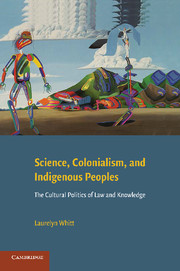First Words
Published online by Cambridge University Press: 04 August 2010
Summary
This book speaks to political issues that lie at the intersection of indigenous studies, science studies, and legal studies, focusing in particular on the role of power in shaping the interaction of indigenous and western knowledge systems. Pursuit of knowledge of the natural world has long been politicized. In some cases this has been subdued, a matter of inflection; in others it has been more pronounced, a dominant and dominating agenda for research. The vital role of science as a part of statecraft has been underscored by numerous historians of science, who, in the latter part of the twentieth century, began to document the “issues of cultural and economic domination involved in the pursuit of natural knowledge.” The rule of law, they argue, was identified with the scientific method and became, for the West, a vital means of extending empire. The conduct of imperial science by nation-states during the late eighteenth and nineteenth centuries, and its effect upon other nation-states, has led historians of science to conclude that the issue is no longer science in imperial history but science as imperial history.
My concern here is with the continuation of one strand of that history into the present, with how a new imperial science impacts, and is impacted by, indigenous peoples rather than nation-states. Certain areas of contemporary bioscience, currently in the service of western pharmaceutical and agricultural industries, are enabling the appropriation of indigenous knowledge and genetic resources at a prodigious and escalating rate. Opposition to such biocolonialism has not only been vigorous, but international in scope.
- Type
- Chapter
- Information
- Science, Colonialism, and Indigenous PeoplesThe Cultural Politics of Law and Knowledge, pp. xiii - xviiiPublisher: Cambridge University PressPrint publication year: 2009



